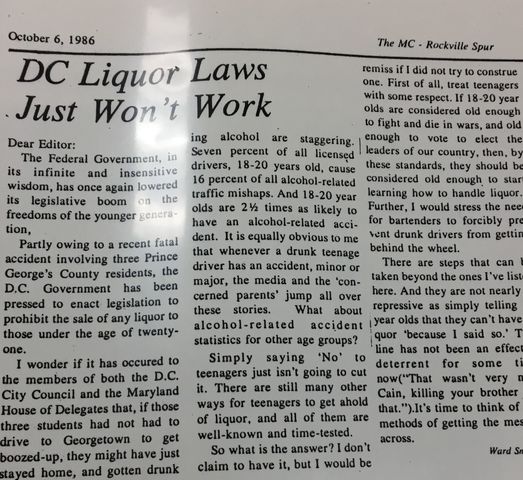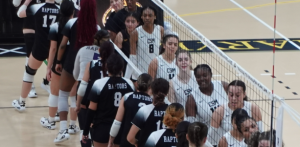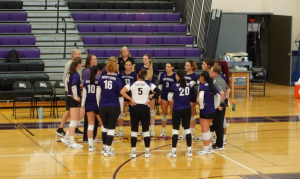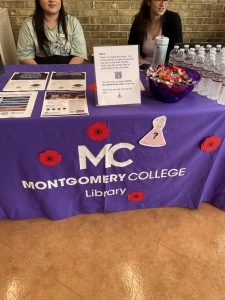Throwback Thursday: DC Liquor Laws Just Won’t Work

October 12, 2017
n 1984, Congress passed the National Minimum Drinking Age Act, requiring states to raise their drinking age to 21 by October of 1986. Funnily enough, a former writer for the Advocate, Ward Smalley, wrote an editorial about this law change—echoing many similar arguments used today about lowering the drinking age in this article written Oct. 6, 1986. 17 percent of all fatal alcohol-related crashes are caused by underage drinkers. What’s interesting is that 31 years ago, that number was only 16 percent, according to drivinglaws.org. From statistics alone, it doesn’t seem that lowering the drinking age has changed much. And as Smalley says in his article, these teens will find a way to drink, no matter what laws prevent them. Apparently, Just saying “no” doesn’t work, evident by 31 years of repeated accidents.
Dear Editor,
The Federal Government, in its infinite and insensitive wisdom, has once again lowered its legislative boom on the freedoms of the younger generation.
Partly owing to a recent fatal accident involving three Prince George’s County residents, the D.C. Government has been pressed to enact legislation to prohibit the sale of any liquor to those under the age of twenty-one.
I wonder if it has occurred to the members of both the D.C. City Council and the Maryland House of Delegates that, if those three students had not had to drive to Georgetown to get boozed-up, they might have just stayed home, and gotten drunk on beer with some friends?
A similar kind of legislation was once practiced on every age group. That period of time is infamously known as the Prohibition Era.
It seems, however, that the various Congresspersons and private citizens supporting this kind of legislation have forgotten the lesson of Prohibition. I am not insensitive to the horrific traffic fatalities of late; I am simply saying that these kinds of laws do not work, have not worked, and will not work.
The statistics regarding teenage traffic accidents involving alcohol are staggering. Seven percent of all licensed drivers, 18-20 years old, cause 16 percent of all alcohol-related traffic mishaps. And 18-20 year olds are 2 and 1/2 times as likely to have an alcohol-related accident. It is equally obvious to me that whenever a drunk teenage driver has an accident, minor or major, the media and the ‘concerned parents’ jump all over these stories. What about alcohol-related accident statistics for other age groups?
Simply saying ‘No’ to teenagers just isn’t going to cut it. There are still many other ways for teenagers to get ahold of liquor, and all of them are well-known and time-tested.
So what is the answer? I don’t claim to have it, but I would be remiss is I did not try to construe one. First of all, treat teenagers with some respect. If 18-20 year olds are considered old enough to fight and die in wars, and old enough to elect the leaders of our country, then, by these standards, they should be old enough to start learning how to handle liquor. Further, I would stress the need for bartenders to forcibly prevent drunk drivers from getting behind the wheel.
There are steps that can be taken beyond the ones I’ve listed here. And they are not nearly as repressive as simply telling 18 year olds that they can’t have liquor ‘because I said so.’ That line has not been an effective deterrent for some time now (“That wasn’t very nice, Cain, killing your brother like that.”) It’s time to think of new methods of getting the message across.
Ward Smalley”











